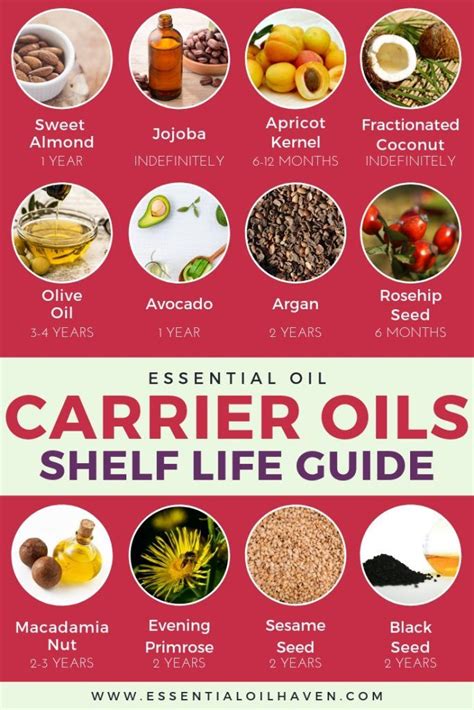An Essential Guide to Essential Oil Carriers
Essential oils, extracted from plants and used for their therapeutic properties, are becoming increasingly popular in the realm of natural wellness. However, to effectively utilize these concentrated oils, it is crucial to invest in a suitable carrier.

An essential oil carrier is a substance that dilutes the concentrated oil, making it safe for topical application, diffusion, or internal use. Choosing the right carrier is essential to ensure optimal absorption, prevent skin irritation, and maximize the benefits of essential oils.
11 Essential Oil Carrier Types: Your Comprehensive Guide
-
Fractionated Coconut Oil: Absorbs quickly, is non-greasy, and is ideal for dry or sensitive skin.
-
Sweet Almond Oil: Rich in vitamins A and E, it nourishes and moisturizes skin while enhancing oil absorption.
-
Grapeseed Oil: Lightweight and non-comedogenic, it is suitable for all skin types and does not clog pores.
-
Jojoba Oil: Mimicking the skin’s natural sebum, it balances oil production and provides antioxidant protection.
-
Argan Oil: Rich in antioxidants and fatty acids, it revitalizes and softens the skin, making it suitable for mature or dry skin.
-
Hazelnut Oil: High in vitamin E and linoleic acid, it soothes and rejuvenates the skin while improving elasticity.
-
Apricot Kernel Oil: Light and easily absorbed, it is gentle on sensitive skin and provides deep hydration.
-
Sunflower Oil: Contains high levels of vitamin E, protecting the skin from free radical damage and improving its texture.
-
Avocado Oil: Rich in vitamins A, D, and E, it nourishes and moisturizes dry or damaged skin.
-
Olive Oil: Contains squalene, a natural antioxidant that protects the skin from environmental stressors.
-
Beeswax: When combined with oils, it creates a balm or salve, providing a thicker consistency for topical application.
7 Essential Oil Carrier Uses: Maximizing Your Benefits
-
Topical Application: Essential oils diluted in carriers can be applied to the skin for a wide range of therapeutic purposes, including pain relief, inflammation reduction, and skin rejuvenation.
-
Massage: Blends of essential oils in carriers are often used in massages, providing both physical and emotional relaxation, as well as promoting overall well-being.
-
Diffusion: Essential oils diffused in the air using a carrier, such as water, can create a soothing or invigorating atmosphere, promoting relaxation, reducing stress, and improving air quality.
-
Inhalation: Inhaling essential oils diluted in a carrier can provide direct access to the respiratory system, offering relief from congestion, sinus headaches, and respiratory infections.
-
Bath Soaks: Adding essential oils to bathwater using a carrier can create a relaxing and therapeutic experience, promoting relaxation, reducing stress, and improving sleep quality.
-
Internal Use: Some essential oils, when diluted in a carrier such as honey or vegetable oil, can be taken internally for therapeutic benefits, such as supporting digestion, boosting immunity, and reducing inflammation.
-
Hair Care: Essential oils mixed with a carrier can be applied to hair to promote growth, reduce dandruff, and improve hair texture and shine.
Choosing the Right Essential Oil Carrier: A Step-by-Step Approach
-
Consider Your Application: Determine how you plan to use the essential oil carrier (e.g., topical, diffusion, etc.) to select the most appropriate type.
-
Skin Sensitivity: If you have sensitive skin, opt for hypoallergenic carriers like fractionated coconut oil, sweet almond oil, or jojoba oil.
-
Absorption Rates: Different carriers absorb at varying rates. Choose a carrier that quickly absorbs for immediate benefits or a slower-absorbing carrier to prolong the effects.
-
Comedogenicity: Avoid comedogenic carriers, such as sunflower oil, if you have acne-prone skin.
-
Scent: Some carriers have a distinct scent that may interfere with the essential oil’s aroma. Choose unscented carriers for a neutral base.
Tips and Tricks: Enhancing Your Essential Oil Carrier Experience
-
Always Dilute: Never apply concentrated essential oils directly to the skin or ingest them undiluted.
-
Start with a Low Concentration: Begin with a small concentration of essential oil in the carrier and gradually increase it as needed.
-
Store Properly: Store essential oils and carriers in a cool, dark place to preserve their potency.
-
Experiment with Blends: Use different carriers and essential oil combinations to create customized blends for specific purposes.
-
Incorporate Your Imagination: Explore new applications for essential oil carriers, such as creating natural cleaning products or enhancing your daily skincare routine.
Additional Resources:
- National Association for Holistic Aromatherapy
- Alliance of International Aromatherapists
- Essential Oil Carrier Calculator
